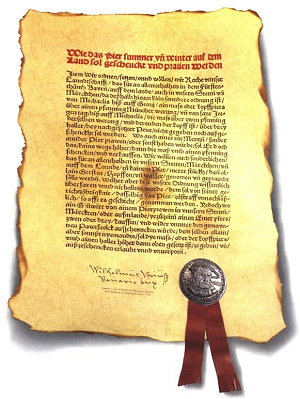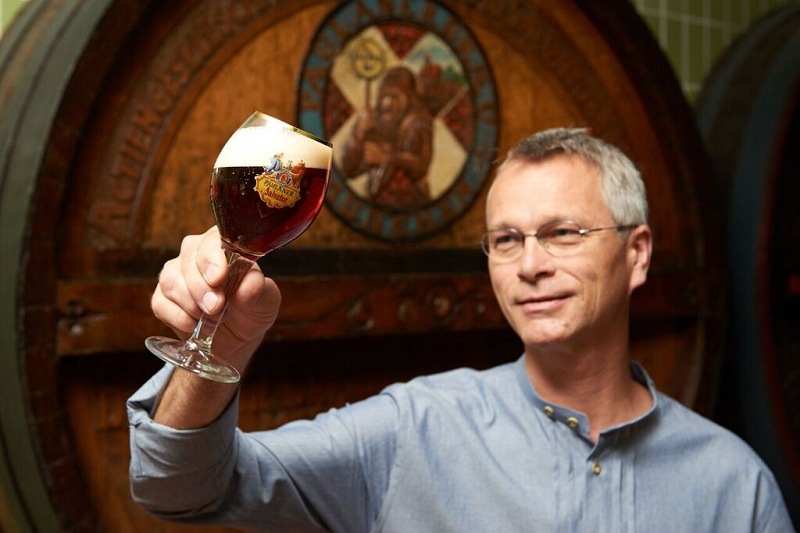Sponsored: Innovation Reigns under Reinheitsgebot
Presented by Paulaner Brewery

(Photo courtesy Paulaner Brewery)
This year marks the 500-year anniversary of the famous Reinheitsgebot decree. In 1516, the rulers of Bavaria stipulated that all beer must be made with only barley, hops, and water.
One of their apparent goals was to keep beer “pure”–in other words, free of cheap additives such as roots and grasses, which often were unhealthy to boot. In the Middle Ages, adding “fillers” to beer was common and degraded both its quality and safety. Luckily, the beverage was an important dietary staple of the times, so the Bavarian guys in charge imposed Reinheitsgebot to deal with the problem. Like many administrators through the ages, they also wanted to regulate pricing and sales of alcohol.
The Reinheitsgebot remains in effect to this day, and all German breweries make beer within these somewhat rigorous standards, including Munich-based brewery Paulaner, founded in 1634. Brewing under this ancient law requires that brew masters be skilled in order to derive so many different beer styles from these basic ingredients.
“This regulation in no way limits the brew masters,” says Martin Zuber, Paulaner brew master. “When I produce a beer with malt, hops, water, and yeast, and then use the same ingredients for another brew, but mash in a different way, the result is two different styles of beer. There is still so much experimentation to be done with hops, malt, fermentation time, and strains of yeast.”

Martin Zuber, brew master at Paulaner Brewery, raises a glass of Salvator double bock. (Photo courtesy Paulaner Brewery)
There are hundreds of hops varieties available, with new and experimental ones cultivated every year. Grains, like grapes, have terroir, and their flavor can vary depending on soil, grow temperature, and aridity. There are likely as many different yeast strains as there are beer styles (and both are expanding). Water, too, affects flavor, depending on its mineral content and pH. Thus, mixing these four basic components, in all their varietal glory, offers exponential opportunities for beer.
While yeast initially was not listed as an approved ingredient by the Reinheitsgebot, it was added in later. Early German brewers likely knew how important yeast is to the process of fermentation, and it’s unclear why it wasn’t included 500 years ago. (Matthias Trum, the sixth-generation family owner of Bamberg’s famous rauchbier brewery Schlenkerla, explains how we should actually understand that famous omission here.) The law was modified in 1906 as well to include other types of malted grains in addition to barley, namely wheat.
Zuber oversees production of the iconic styles that American beer drinkers identify with Paulaner, including Hefe-Weizen, Oktoberfest, Double Bock, Pils and Hells/Lagers. He also supervises Brauerei im Eiswerk, Paulaner’s in-house microbrewery, where he and his team can experiment within the boundaries of the Reinheitsgebot.
“New hop variations are being developed in Hallertau, which create new flavors. There are millions of combinations of beer yet to be brewed while still adhering to the Bavarian Purity Law,” Zuber says. “Popular brewing methods like dry hopping and barrel-aging are compliant with the Bavarian Purity Law. Although it’s a 500-year-old law, there are plenty of advancements to be made in brewing.”
Obviously, barrel aging is nothing new–beer has been aged and stored in wooden barrels for centuries. Dry hopping is a more recent technique where hops are added “dry” during fermentation to increase the aroma and flavor of the final beer. While many beer lovers equate German-styles with crisp, malty lager flavors, this is changing as processes evolve.
The Reinheitsgebot, which was signed into law on April 23, will be celebrated this year worldwide for its longevity and contribution to beer quality. The German breweries, in particular, will raise a stein to the law that both regulates and inspires them.
Editor’s note: This article has been updated from an earlier version to include additional context regarding what German brewers knew of yeast when the Reinheitsgebot was enacted. You can read more on this subject here.

Reinheitsgebot was repealed many years ago
Ein bier bitter